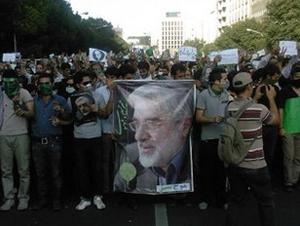Election protests and Iran’s clerics
Silent protest in Tehran (Image: flickr user .faramarz (cc:by-nd))
The following is not a full transcript; for full story, listen to audio.
If Iran’s election was rigged, was it part of a power play by President Mahmoud Ahmadinejad to destabilize the country and oust the country’s ruling clerics? That’s one theory being discussed as protestors take to the streets of Tehran in support of opposition candidate, Mir Hossein Mousavi.
"Here and Now" spoke to Babak Rahimi, a professor at UC-San Diego. He fled Iran in the 1980s after his father was assassinated, but returned this year to study the electoral process.
Rahimi says Mousavi is positioning his campaign as a movement that goes beyond the election: "He sees this as a kind of social movement that will eventually make Iran more democratic and ultimately less authortarian."
There is a major split within the conservative establishment of the Islamic Republic according to Rahimi: "The so-called old guard — the first revolution generation that even people like Mousavi were a part of; and the kind-of mid-age revolutionists, like Ahmadinejad who perceive the old guard as kind of corrupt and outdated."
The revolution generation Rahimi refers to is the post-1979 Revolution, which overthrew a Western-backed regime. The split is between the hard line conservatives and those, like Mousavi, who are looking for reform.
Rahimi explains the kind of democracy the reformists are after: "The people I’ve been talking to, especially the pro-Mousavi, they do want that religion would play some form of role in this envisioned democracy for Iran … it’s a … religous democracy that is not tyrannical, it’s not authoritarian … sure the clerics could be in the public sphere, sure religion could be part of the public way in which people interact with one another, you would even have political parties that can be highly Islamic.
"But there shouldn’t be one dominant Islamic ideology that should tell people how to act, how to think, how to behave. There’s an interesting clash of interpretation over how, first of all to be Islamic; and second of all, how to establish a government that is fundalmentally accountable and does not necessarily exclude religion …"
Rahimi believes there is a coup in progress to oust the clerics: "There’s a way of trying to marginalize the conservative clerics that originally were in power in the 80s. Now when I say clerics here, I’m talking about clerics who see themselves to be the head of the state to a certain extent. Now Ahmadinejad also wants religion to be the source, the foundation of the state; however he sees himelf as a non-cleric, as a poplulist figure, to be a central figure in this Islamic republic … and right now we are seeing a major conflict between the so-called populist Islamists, like Ahmadinejad — the young guard — against the older guards who very much see the clerics to be completely dominating the entire political process in Iran."
"Here and Now" is an essential midday news magazine for those who want the latest news and expanded conversation on today’s hot-button topics: public affairs, foreign policy, science and technology, the arts and more. More "Here and Now"
